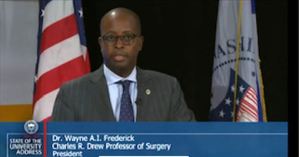Scriptural text: Titus 1:1-3; 2:11-15
Lesson Context: Paul wrote this letter to Titus in about AD 65 after departing from the Island of Crete. Paul had left Titus behind to correct a chaotic situation in the Cretan churches. Most importantly, Titus needed to place an eldership in each congregation (Titus 1:5). The church in Crete was troubled by people who professed to know God but lived demonstrably different lives. Such people had deceived others, disrupted the community (1:10-11), and brought needless controversy to the church (3:9-10).
Today’s lesson reveals Paul’s solution to this challenging situation.
l. The Messenger (Titus 1:1-3):
A. “Servant and Apostle” (v. 1). La. Paul, a servant of God, and apostle of Jesus Christ. Paul was only a bondservant-yet he had a high place, because He was a bondservant of God. It is never a low thing to be a servant of a great God. And an apostle of Jesus Christ: God gave Paul a special role to play among His servants. Paul’s particular call and function was as a special messenger of God-an apostle. Paul knew his call and purpose among the body of Christ, and so should each Christian today also know for themselves. (David Gutz Bible Commentary)
lb. “According to the faith of God’s elect, and the acknowledging of the truth which is after godliness.” Paul wasn’t an apostle because of the faith of God’s elect, but in harmony with the faith (in the sense of a specific common body of doctrine) shared among God’s elect. God’s elect are those whom He chose from before the foundation of the world to receive salvation. We can identify God’s elect because they respond to the gospel of Jesus Christ and their lives after that gospel. The acknowledgment of the truth: For Paul it wasn’t enough to just believe, he also had to acknowledge it for what it really was. (David Gutz Bible Commentary)
B. Commanded by God (vv. 2-3): 2. “In hope of eternal life, which God, that cannot lie, promised before the world began.” Eternal Life: This is the life of the Eternal God living within us. It is present now, but will be completed later. Which God, who cannot lie, promised: This eternal life is not a wish, but hope. In the sense, hope is an anticipation founded not on wishful thinking, but on a promise from the God who cannot lie. 3. “But hath in due time manifested his word through preaching, which is committed unto me according to the commandment of God our Saviour.” Paul knew that preaching is the way that God’s eternal work meets people today. Preaching is the way of God’s word is made evident (manifested). But in due time manifested His word: Christianity came into the world at a time when it was uniquely possible for its message to spread rapidly. (David Gutz Bible Commentary)
ll. The Message (Titus 2:11-15):
A. Grace Appeared (vv. 11-12): Grace Appeared (vv. 11-12):
ll. “For the grace of God that bringeth salvation hath appeared to all men.” Grace brings salvation. You don’t go out and “get” salvation; it comes to you and you have the opportunity to receive it. Has appeared to all men: There is one gospel of grace for all men. God doesn’t have a gospel of grace for some and a gospel of law or self-justification for others. All men find salvation by the grace of God.
12a. “Teaching us that, denying ungodliness and worldly lusts.” Grace puts ungodliness and worldly lusts in our past. Now grace teaches us to renounce those things, not only to avoid them. Denying: “This indicates the renunciation of the Devil, of the vanity of this world, and of all the sinful lusts of the flesh.” (White)
B. Hope Promised (vv. 13-14): 13. “Looking for that blessed hope, and the glorious appearing of the great God and our Saviour Jesus Christ.” Looking for the blessed hope: Grace teaches us to expect and prepare for our blessed hope. That hope is not heaven or glory, but Jesus, face to face, closer than ever. Looking indicates that Christians should live in active expectation of the return of Jesus. (David Gutz Bible Commentary)
14. “Who gave himself for us, that he might redeem us from all iniquity, and purify unto himself a peculiar people, zealous of good works.” Every word of this description is important. Jesus gave, which means it was voluntary. He gave Himself, which means Jesus gave all He could give. And He gave Himself for us, which means Jesus was given as a substitute for sinful man. That He might redeem us: Redemption means “to be bought out of slavery by the paying of a ransom.” We are bought out of slavery to sin, and purchased for His service.











